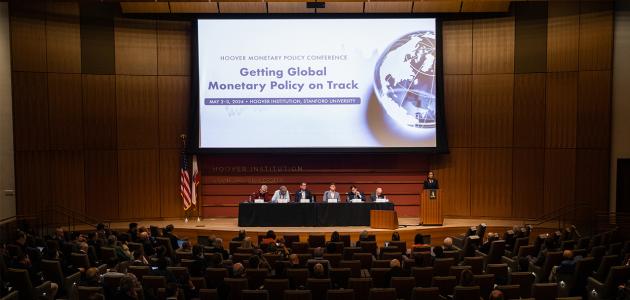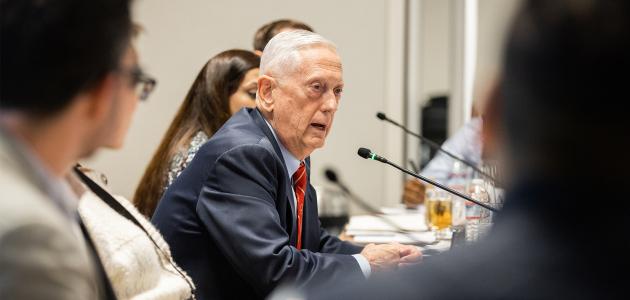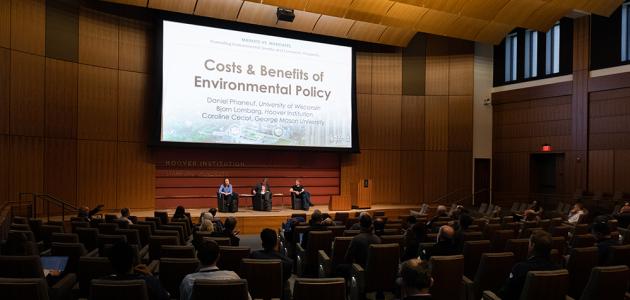
It has been four years since the world was upended by COVID-19. From changes in how we work to unprecedented federal borrowing and a four-decade high in inflation, the pandemic’s effects on the economy can still be seen today. From the outset of the crisis, Hoover scholars have analyzed these economic challenges with a focus on what policymakers must do next.
FEATURED ANALYSIS

Hoover senior fellow Steven J. Davis has been at the forefront of documenting the dramatic increase in remote work. Davis discusses these trends with his coauthor, Nicholas Bloom, in the November 2023 edition of Davis’s podcast, Economics Applied. Davis and Bloom “discuss the big shift to work from home, what it means for productivity, why perceptions in this regard often differ between managers and workers, and why—on balance—the big shift is a blessing.”
Davis, along with his coauthors Jose Maria Barrero and Nicholas Bloom, describe the evolution of work from home both before and after COVID in this Fall 2023 essay in the Journal of Economic Perspectives. The paper highlights how the adoption of remote work varies considerably depending on workers’ industries, occupations, education, and where they live. Ultimately, the uneven take-up of remote work may “profoundly influence the nature and intensity of competition in the labor market.”
Read more of Davis’s work here.

HIGHLIGHTS
The Future of the Federal Budget after COVID-19
The pandemic led to a massive increase in federal spending as policymakers sought to mitigate the perceived economic harms of the shutdowns. From the 2020 CARES Act to the American Rescue Plan Act of 2021, Congress approved nearly $5 trillion in new federal spending. In this October 2023 essay, Hoover senior fellow Michael Boskin argues that while some of the initial spending may have been justified, policymakers’ unwillingness to consolidate their budgets now is “extremely irresponsible” and makes the US economy and other advanced nations “highly vulnerable to another shock.”
Boskin contends that advanced nations must now gradually slow government spending on transfer programs. This is particularly necessary as economic growth slows in advanced economies. Without spending restraint, the alternatives—higher taxes or more borrowing—will reduce economic opportunities for future generations. It also will undermine the nation’s security. At a time of “renewed risk of war, terrorism, and other security threats,” the excessive spending will make it more challenging to invest in our national defense.
Boskin authored a detailed analysis of the dangers of large deficits in this 2020 working paper.
Lessons Learned About Inflation
Inflation peaked at a four-decade high in 2022. While it has since slowly declined, there are many lessons to learn. In this August 2023 commentary, John Cochrane argues that the relationship between inflation and fiscal policy is key to understanding the nation’s recent experience with inflation:
Inflation peaked in June 2022 and continues to ease, with interest rates below inflation until April 2023 and no recession. Why? Again, fiscal theory provides a straightforward answer. A one-time $5 trillion fiscal blowout causes a one-time rise in the level of prices, just enough to inflate away the value of the debt by $5 trillion. Then inflation stops, even if the Federal Reserve does nothing.
Other theories to explain inflation fail to provide an understanding of the recent experience—most notably the concept that there is a strong inverse relationship between inflation and employment. Cochrane reminds readers, “A year ago, a loud chorus said that inflation couldn’t be tamed without a recession, and without interest rates substantially above inflation, as in the early 1980s.” Despite these predictions, inflation has fallen while the economy remains strong.
Cochrane warns that a “fiscal point of view isn’t encouraging about the future.” Inflation remains above the Federal Reserve’s targets. Meanwhile, federal deficits are projected to grow to new heights in the coming years. As a consequence, in the next crisis the inevitable federal borrowing will mean “another cycle of inflation will surely erupt, no matter what the Fed does with interest rates.”
Cochrane’s 2003 book The Fiscal Theory of the Price Level offers an in-depth exploration of the relationship between fiscal policy and inflation.
The Banking System
The Federal Reserve’s dramatic increase in interest rates in response to the high inflation produced significant issues for the nation’s banking system. These issues surfaced in March 2023 with the prominent failures of Silicon Valley Bank and Signature Bank. Since then, the banking system has largely avoided additional failures, but the underlying vulnerabilities remain. Hoover senior fellow Amit Seru has examined how rising interest rates have “increased the fragility of the US bank system.”
The system remains fragile to bank runs where uninsured depositors withdraw their funds from banks during a perceived crisis. Banks most at risk are ones “with low capital levels; a high ratio of uninsured deposits to assets, called uninsured leverage; and those for which the true market value of their assets is far lower than the stated value of those assets on their books.” Seru estimates that if half of uninsured depositors withdrew their funds, nearly 190 banks would be “at a potential risk of impairment.”
While short-term actions by policymakers “put a pause on the crisis and reduced the risk of acute deposit runs,” they did little to address the long-term insolvency risks. In this video, Seru proposes a long-term solution to the problem. He argues for larger equity requirements so that banks have “skin in the game.” This reform “will be less disruptive to the economy than having a large number of small and medium sized insolvent banks drain taxpayer resources and, eventually, fail.”
Fellow Spotlight: John H. Cochrane

John H. Cochrane is the Rose-Marie and Jack Anderson Senior Fellow at the Hoover Institution. He is also a researcher at the National Bureau of Economic Research and an adjunct scholar of the Cato Institute. He was formerly a professor of finance at the University of Chicago’s Booth School of Business. His academic work focuses on dynamics in stock and bond markets, the volatility of exchange rates, and other market matters. On the public side of the ledger, he writes about the relationship between fiscal deficits and inflation, the effect of monetary policy, and the fiscal theory of the price level.
In 2023, Cochrane published the magnum opus of his career as an economist, The Fiscal Theory of the Price Level (Princeton University Press). That year, Cochrane was awarded the nineteenth annual Bradley Prize by the Lynde and Harry Bradley Foundation. His work appears frequently in national news outlets including the Wall Street Journal and Bloomberg, as well as his personal blog, The Grumpy Economist.






















